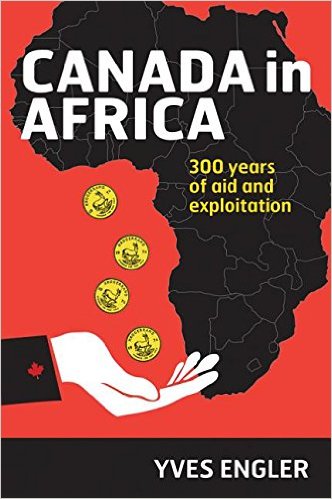Like this article? rabble is reader-supported journalism. Chip in to keep stories like these coming.
The strength of a myth is probably clearest in its capacity to seduce its victims as much as its beneficiaries. While white Canadians have an ego-massaging reason for believing that this country is faultless, a moral beacon, and a peacekeeping global citizen, the fact that some immigrants are equally misled is a testament to the myth’s endurance.
I immigrated to Canada from Eritrea, a north-eastern African country, at the age of three. Since then, I’ve heard the myth of Canada’s relationship with Africa — from settlers and immigrants alike. It’s embedded in the talking points of this country’s state representatives, in our media’s echoing of government press releases, and in casual conversations about good Canadians helping those poor Africans.
But, it is, of course, a lie — a construction begun long ago, persisting to conceal exploitation, theft, and brutality.
Yves Engler tells this long story in Canada in Africa: 300 Years of Aid and Exploitation. It’s not his first book detailing this country’s foreign policy. He’s also written The Ugly Canadian: Stephen Harper’s Foreign Policy (2012); Canada and Israel: Building Apartheid (2010); Black Book of Canadian Foreign Policy (2009); and Canada in Haiti: Waging War on the Poor Majority (2005), co-written with Anthony Fenton; among a few other books.
His latest uncovers the participation, before Confederation, of the colonies on current-day Canada in the slave trade, where they either kept enslaved Africans or helped suppress rebellions in the Caribbean. The Canadian government enthusiastically supported colonial governments and actively opposed independence movements during the middle of the 20th century.
“[D]espite delivering (free of charge) weaponry to the colonial powers,” Engler writes, “Ottawa never sold, let alone gave, arms to anti-colonial movements.” The Canadian military, Engler reminds us, went as far as helping overthrow nationalist leaders like Patrice Lumumba and Kwame Nkrumah — both the first elected, and widely supported prime ministers of their respective countries, the Congo and Ghana.
Since the 1980s, the Canadian government has promoted structural adjustment programs, under the guise of aid, to decimate African economies by open borders for trade on unequal terms.
Today, the Canadian government extensively subsidizes mining exploration firms throughout the country. Vancouver, where I reside, a virtually tax-free haven for corporations of all kinds, is a hub for the extractive industry.
Engler writes about Nevsun Resources, which has been operating in my country of origin: Eritrea. It has been accused of using forced labour through Eritrea’s “National Service” program, a labour mill made up of indefinite military conscripts. Poor wages, torture, harrowing work conditions: this is the life of a labourer at a Vancouver company’s mining site.
Left out of the account by Engler, additionally, Eritrea is one of the largest sources of refugees today, ranking third on a list of people crossing the Mediterranean by boat over the last few years. And one of the reasons so many are leaving is the likely threat of being conscripted into a program of slave labour for years — and sometimes over 10 years.
This is Canada exposed — Canada’s involvement and intrusion into Africa revealed.
Not one to leave the reader with stories of just exploitation, however, Engler also describes throughout the continent in opposition to Canadian activities. The various social movements, from condemnation of Canada’s tacit approval of apartheid South Africa to efforts to nationalize resources and challenge mining companies. Three Eritreans, for instance, recently sued Nevsun Resources for their complicity in slavery. More than anything, African opposition to Canada’s involvement underscores the real character of the latter’s involvement.
By promoting the African opposition and activism throughout the book, Engler’s latest work is important and welcomed.
And the fact that the book does not pretend to neutrality is especially refreshing. Engler writes very early on that his goal is “to engender solidarity with Africans and antipathy towards Canada’s foreign-policy intelligentsia.”
Canada’s history speaks for itself — and, by studying it, with this book as a guide, solidarity and antipathy might just be a certainty.
Daniel Tseghay is a writer of Eritrean descent living in Vancouver.
Check out Yves Engler on his book tour for Canada in Africa:



